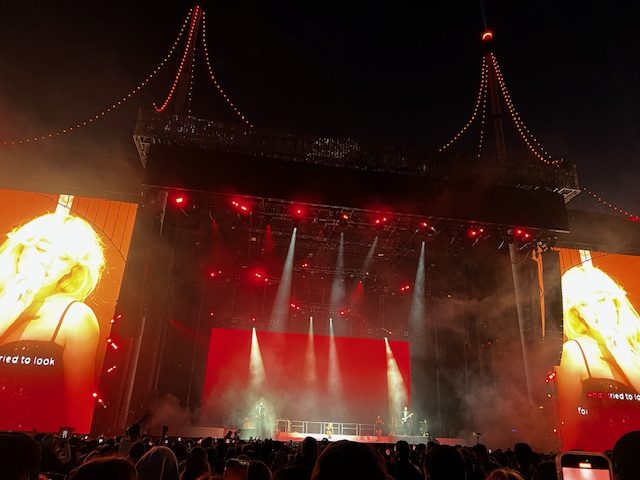Evangeline Ford
Features Editor
In August, Sabrina Carpenter headlined Outside Lands, a yearly music festival that takes place in San Francisco, and the crowd was buzzing. When she made her way onto the stage, preceded by a retro television backdrop appearing on the full-stage screen, the crowd lost it. My friend and I managed to make our way close to the front of the sea of people, and when Carpenter, who had spent the last year opening for Taylor Swift and dominating the Billboard Top 100 charts, began singing, the girls on either side of us knew every word.
Sabrina Carpenter has become a pop phenomenon, following closely in the footsteps of giants like Taylor Swift, Ariana Grande, and Miley Cyrus. She has become known for her sweet yet raunchy persona, with lyrics that make even the most experienced audiences blush. She stays grounded with a smile and color palette that makes middle-school-aged Taylor Swift fans feel at home. Does this account for her rapid rise to fame? Is it the personality-relatability-catchiness combo that has taken so many before her to the top? I’d argue it has a lot to do with a genius marketing team and well-played drama.
When Olivia Rodrigo released the song “drivers license,” speculated to be referencing Carpenter’s relationship with the man she sings about, Sabrina Carpenter became an instantaneous bad guy. In the current pop landscape, where performers reveal more and more of their personal lives, Taylor Swift stands at the center, and one key element of her persona is her ability to create a villain. Over the years, Swift has created exceptionally hateable opponents out of those who have wronged her with virtually every album she releases. These villains are often very well-paid and live happy lives, but occasionally, they fade into infamy, never to return to the Met Gala or the more tasteful gossip magazines. With the success of “drivers license,” Sabrina Carpenter risked that kind of villain-hood.
Carpenter’s manager, Janelle Lopez Genzink, is very good at her job. Lopez Genzink is known for being “laser-focused,” and during the year of “emails i can’t send,” had honed her skills in “brand building” and “data and analytics.” This was perfect timing on her manager’s part, as the album dealt with much of the controversy she faced as a result of “drivers license.” Her transparency helped fans get a glimpse into her world on the other side of the drama and accept her new position as the underdog.
In 2023, Carpenter released a music video for her song “Feather,” filmed in a Catholic church in New York with the permission of the priest in charge (a priest who ended up being at the center of the Eric Adams scandal, but that’s another article). This video sparked a great deal of backlash, not only towards the priest who gave her permission but towards Carpenter herself. This was one of Carpenter’s first forays into shamelessness, which, coupled with her frilly, cutesy, pastel aesthetic, is not only palatable but incredibly engaging. This was also a controversy that her management embraced, adopting the common Hollywood philosophy that “all press is good press.” Carpenter’s new persona and public rebellious streak made any slight towards Olivia Rodrigo just another aspect of her captivating personality. Instead of the evil stepsister to Rodrigo’s Cinderella, Carpenter was able to absorb the promiscuous image that had been thrown at her and turn it into a brand — a brand that bled into her lyrics, her costumes, and her famous “Nonsense” endings, where she creates a different clever ending to her song “Nonsense” depending on where she’s playing.
Sabrina Carpenter is nothing short of a global superstar, and has been made such by the same thing that catapults many a “pop girl” to stardom alongside the best athletes, actors, and television personalities: a great team.











